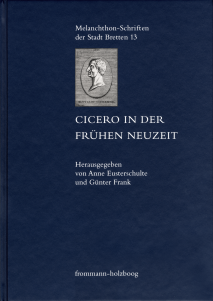Cicero in der Frühen Neuzeit
Links / Downloads
There are vast amounts of research and publications on Marcus Tullius Cicero (106–43 v. Chr.) as an author in antiquity, a statesman, rhetor and philosopher. This is not however the case as far as his impact is concerned, especially in the early modern period. His writings in this time had an immense presence, which has previously not received much attention in research. The articles in this volume, the result of a symposium held by the ›European Melanchthon Academy‹ in Bretten, document and analyze the traces and the impact of Cicero’s writings in this era. Thus this book conducts fundamental research in an area which up to now had been largely unexplored. Using specific examples, the articles show the reception of Cicero in the early modern period from the perspective of historiography, literature, literary criticism and rhetoric and deal particularly with the forms of impact and appropriation which his works took as well as their theological implications.
Content:
Anne Eusterschulte/ Günter Frank: Vorwort
Anne Eusterschulte/ Günter Frank: Cicero in der Frühen Neuzeit. Eine Einführung
Günter Gawlick: Die Cicero-Memoria zwischen Verehrung und Verachtung
Ursula Kocher: Gasparino Barzizza (ca. 1360–1431) – ein Wegbereiter Ciceros als Ideal rhetorischer Praxis
Felix Mundt: Die Diskussion um die falsche »Consolatio« von 1583 im Kontext des Ciceronianismus
Judith Steiniger: Einflüsse Ciceros in Ortensio Landos »Forcianae Quaestiones« (Lyon 1535)
Herbert Jaumann: »... mihi solus Christus et Tullius placet«. Ortensio Landos ›Cicero relegatus & Cicero revocatus‹ (1534) und das frühneuzeitliche Paradox
Anja Traninger: Lose Kopplung. Zur Rolle von Ciceros thesis in Erasmus’ Gattungspoetik der Deklamation
Daniel Schäfer: »Cato Maior«-Rezeption in der frühneuzeitlichen Medizin?
Olivier Millet: Die Frage der rhetorischen imitatio ciceroniana bei Philipp Melanchthon
Günter Frank: Cicero in der Theologie der Frühen Neuzeit. Von Philipp Melanchthon bis Hugo Grotius
Gideon Stiening: »Aus den innersten und tiefsten Gründen der Philosophie«. Zur Stellung Ciceros in Francisco Suárez’ ›De legibus ac deo legislatore‹
Uehli Zahnd: Vom »philosophiae Romanae columen« zum »ethnicus ille«. Die Cicero-Rezeption beim jungen Calvin
Andreas J. Beck: Zur Rezeption Ciceros in der reformierten Orthodoxie, insbesondere bei Gisbertus Voetius
Willem van Asselt: The Reception of Cicero’s Friendship Theory in Lambert Daneau (ca. 1530–1595)
Frank van der Pol: Cicero in the Interplay of Principle and Practice. A 17th-century Reformed-Pietistic Approach
Bernd Roling: Dämonen und Bühnenzauber: Ciceros Schrift ›De divinatione‹ in der frühneuzeitlichen Debatte um das Orakelwesen
Ronny Kaiser: Lumen verum und errores – Sixt Bircks Kommentar zu Ciceros ›De natura deorum‹ (1550)
Anne Eusterschulte: Zur Rezeption von ›De officiis‹ bei Philipp Melanchthon und im Kreis seiner Schüler
Christoph Kraume: J.E.D. Bernardis Supplement ›De la République‹ (1798/1807): Eine politische Instrumentalisierung von Ciceros ›De re publica‹ aus der Zeit der Französischen Revolution
Reviews
»The edited volume ›Cicero in der frühen Neuzeit‹, considered from the viewpoint of a Neo-Latin philologist, has the potential to spur new approaches to interdisciplinary research in various fields of early modern intellectual history. The focus on Cicero and the reception and ways of adaptation of his thought helps to reaffirm the imbeddedness of typically «unclassical» phenomena, such as the Reformation and Counter-Reformation, in the context of a living classical tradition. The greatest merit of this publication, however, lies in the identification and appreciation of the influence of Cicero in Reformation and Counter-Reformation theological discourse.«
»[...] this is a handsomely produced volume, filled with insights and suggestions that will doubtless be helpful for future researchers for years to come.«
»Insgesamt gelingt es dem vorliegenden Band, dem selbst formulierten Anspruch gerecht zu werden und tatsächlich Pionierarbeit bei der Erforschung der vielschichtigen und mitunter komplexen Cicero-Rezeption in der frühen Neuzeit zu leisten, indem er manch allzu einseitiges Urteil der älteren Forschung revidiert und methodisch neue Wege beim Aufdecken direkter und indirekter Zitate und wörtlicher wie inhaltlicher Cicero-Bezüge beschreitet.«
All volumes
- Erbe des Humanismus. Wirkungen einer universalen Idee – First half of 2027
- Das 15. Jahrhundert – available
- Die Reformation und ihr Mittelalter – available
- Cicero in der Frühen Neuzeit – available
- Philosophie der Reformierten – available
- Hermeneutik, Methodenlehre, Exegese – available
- Die Patristik in der Frühen Neuzeit – available
- Melanchthon und der Calvinismus – available
- Reformer als Ketzer – available
- Melanchthon und die Neuzeit – available
- Melanchthon und Europa – available
- Melanchthon und Europa – available
- Der Theologe Melanchthon – available
- Melanchthon und die Naturwissenschaften seiner Zeit – available
- Die Kraichgauer Ritterschaft in der frühen Neuzeit – available
- Melanchthonpreis – available
- Melanchthonpreis – available
- Subject Areas
- New Publications
- ---
- Critical Editions
- Collected Works
- Series
- Arbeiten und Editionen zur Mittleren Deutschen Literatur
- Aufklärung und Revolution
- Böhme-Forschungen
- Bibliothek 1800
- Clavis Pansophiae
- Collegium Philosophicum
- Commentaria in Aristotelem Graeca
- Doctrina et Pietas
- Editionen zur Frühen Neuzeit
- Elea
- Europäische Literatur der Frühen Neuzeit
- exempla aesthetica
- Forschungen und Materialien zur Universitätsgeschichte
- Forschungen und Materialien zur deutschen Aufklärung
- Freidenker der europäischen Aufklärung
- Freud heute
- frommann-holzboog Studientexte
- Fundamenta Historica
- Grammatica Speculativa
- Grammatica Universalis
- Kultur und Gesellschaft
- legenda
- Judith Le Soldat heute
- Medizin und Philosophie
- Melanchthon-Schriften der Stadt Bretten
- Mystik in Geschichte und Gegenwart
- Natur und Philosophie
- Neuzeit im Aufbau
- Philosophie interkulturell
- Philosophische Clandestina der deutschen Aufklärung
- Der Platonismus in der Antike
- Politische Philosophie und Rechtstheorie des Mittelalters und der Neuzeit
- problemata
- Psychoanalysis International
- Quaestiones
- Schellingiana
- Specula
- Spekulation und Erfahrung
- Supplementum Platonicum
- Volksaufklärung
- Werkstatt Bionik und Evolutionstechnik
- Bibliographies and Reference Books
- Allgemeine Zeitschrift für Philosophie
- AZP Beihefte
- Jahrbuch der Psychoanalyse
- JP Beihefte
- Steiner Studies
- Open-Access
- Single volumes
- eBooks
- Special Offers
- ---
- Authors
- Publishing house
- Links / Partner
- Paths to Philosophy
